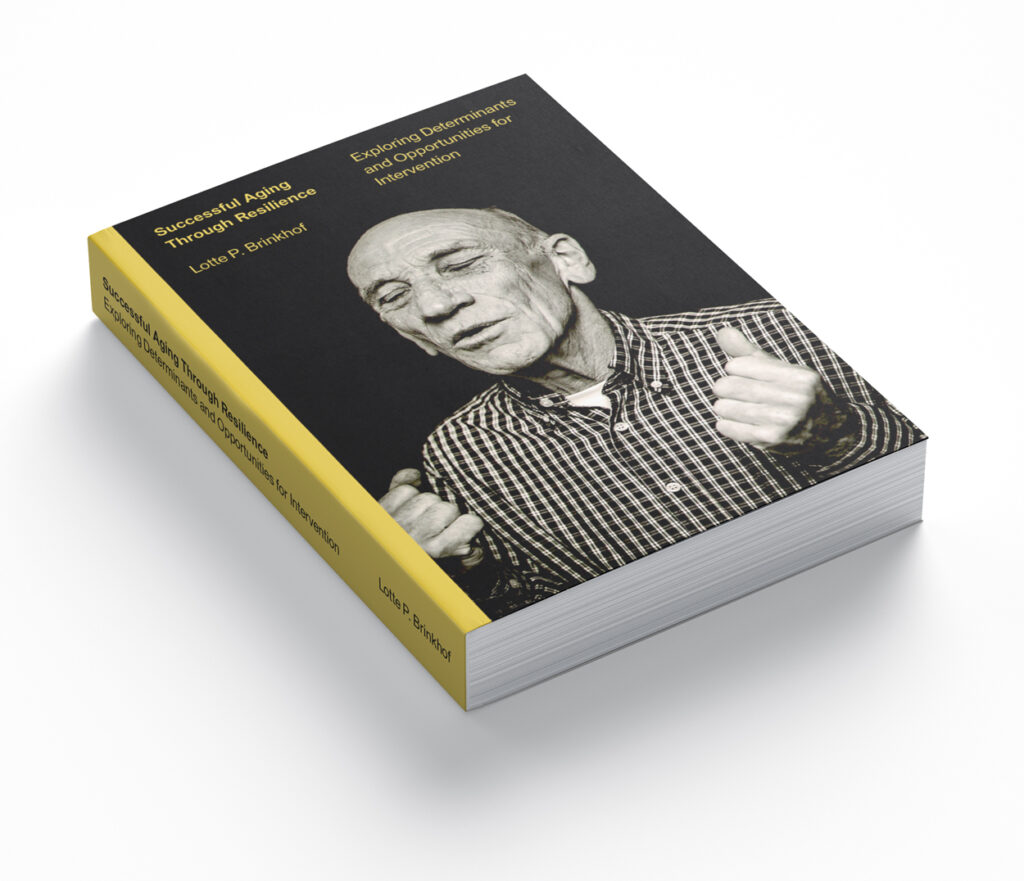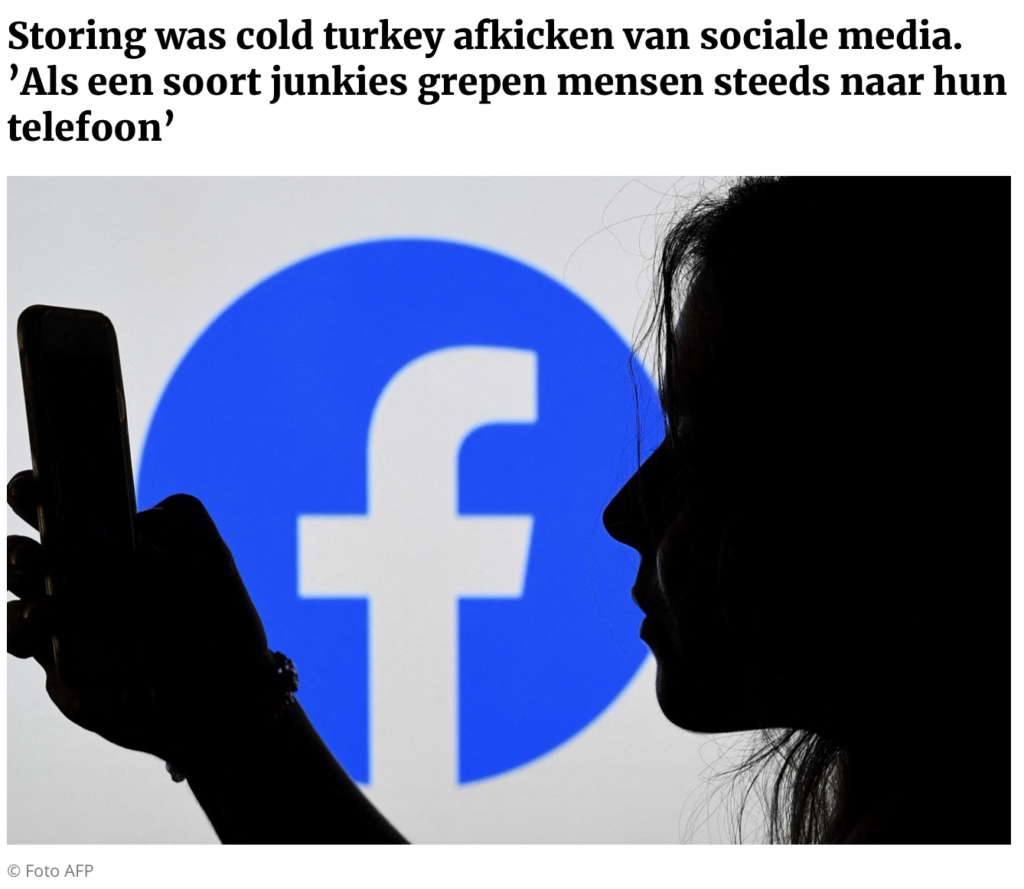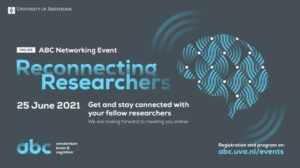On the 2nd of October, Lotte Brinkhof will defend her PhD research on Succesful aging through resilience.
Find more information about her dissertation here


On the 2nd of October, Lotte Brinkhof will defend her PhD research on Succesful aging through resilience.
Find more information about her dissertation here

In our paper “Integrating Neuro-Psychological Habit Research into Consumer Choice Models” we discuss how habit is defined across different disciplines that study human choices. In particular, we examine the role of learning in forming habits; the roles of automaticity, context and cues, and attention; and whether habits reflect a change in preferences or a choice system which is partly decoupled from preferences. These constructs are used to create a framework for economics, psychology, and marketing research, suitable for analysis of consumer choice experiments and datasets.
Read more here: Integrating Neuro-Psychological Habit Research into Consumer Choice Models
“Cortico-striatal white-matter connectivity underlies the ability to exert goal-directed control” – new research of Tim van Timmeren, Irene van de Vijver and Sanne de Wit.
Do habitual and goal-directed control depend on distinct cortico-striatal brain pathways? In a new study, we fail to replicate previous findings, challenging dual-process models of action control.
Many of our actions are repeated every day in the same context, making them highly prone to become habitual. Dual-process models spropose that actions depend on two systems: a flexible goal-directed system and a quick & efficient habit system.
The strongest evidence for two systems comes from lesioning studies in rodents, showing dissociable cortico-striatal pathways for goal-directed and habitual action. However, research in humans is limited.
A previous neuroimaging study in humans (de Wit et al, 2012) used diffusion tenson imaging (DTI) to study structural brain function, combined with an outcome-devaluation paradigm to measure goal-directed & habitual control. This study suggested that dissociable white-matter neural pathways were associated with goal-directed (caudate – vmPFC) and habitual (putamen – premotor cortex) control.
However, the sample size used was small (n=23), Here, we aimed to conceptually replicate these results in a larger sample (n=205). We found that individual differences in goal-directed performance correlated with striatum – dlPFC white matter strength, but no associations with habitual performance.
We discuss these results in the context of recent findings suggesting that it’s variations in goal-directed rather than habitual control that are the main determinant of behavioral flexibility on these tasks in humans.

Together with Dr. Joram Mul of the Fit Brain Lab at the Swammerdam Institute for Life Sciences at UvA, we were awarded a PhD grant by the Centre for Urban Mental Health. In our STRIDE project, we will study determinants of mental health and exercise adherence in Dutch students, and design and implement evidence-based interventions. We will work closely together with our colleague Sascha Struijs, project leader of Caring Universities, colleagues at our respective departments, and directors of student sports centers. We look forward to starting this exciting project soon!
I look forward to being involved in the CAREFREE project: Creating A healthieR Environment for FutuRE patiEnts
This project is coordinated by Maastricht University/MUMC and funded by NWO through the Knowledge and Innovation Covenant’s ‘Collaboration in mission-driven innovation’ (NWO-KIC). I will join the team of Frenk van Harreveld (co-applicant), Jonas Dalege, Monique Chambon (postdoc), Carys Batcup (PhD student).
Dutch healthcare accounts for 7-8% of the total national greenhouse gas emissions. In hospitals, at least 20% of this is related to the operating theatre. This includes waste, inhalation gases for anesthesia, energy for air refreshment, and medicine residues in wastewater. To change the behavior of all stakeholders, this project assembled a very diverse team to make the operating theatre greener by gaining insight into the biggest polluters.
The CAREFREE (Creating A healthieR Environment for FutuRE patiEnts) project aims to fill knowledge gaps but also to provide tools that enhance trust, acceptance, and a change in behavior for the myriad of stakeholders.
Please find further information here.
Improving Goal Striving and Resilience in Older Adults Through a Personalized Metacognitive Self-Help Intervention: A Protocol Paper
Abstract: Successful aging is often linked to individual’s ability to demonstrate resilience: the maintenance or quick recovery of functional ability, well-being, and quality of life despite losses or adversity. A crucial element of resilience is behavioral adaptability, which refers to the adaptive changes in behavior in accordance with internal or external demands. Age-related degradation of executive functions can, however, lead to volition problems that compromise flexible adjustment of behavior. In contrast, the reliance on habitual control has been shown to remain relatively intact in later life and may therefore provide an expedient route to goal attainment among older adults. In the current study, we examine whether a metacognitive self-help intervention (MCSI), aimed at facilitating goal striving through the gradual automatization of efficient routines, could effectively support behavioral adaptability in favor of resilience among older adults with and without (sub-clinical) mental health problems. Methods. This metacognitive strategy draws on principles from health and social psychology, as well as clinical psychology, and incorporates elements of established behavioral change and activation techniques from both fields. Additionally, the intervention will be tailored to personal needs and challenges, recognizing the significant diversity that exist among aging individuals. Discussion. Despite some challenges that may limit the generalizability of the results, our MCSI program offers a promising means to empower older adults with tools and strategies to take control of their goals and challenges. This can promote autonomy and independent functioning, and thereby contribute to adaptability and resilience in later life.
Full reference: Brinkhof, L.P., Ridderinkhof, K.R., Murre, J.M.J., Krugers, H.J., & de Wit, S. (in press in BMC Psychology). Improving Goal Striving and Resilience in Older Adults Through a Personalized Metacognitive Self-Help Intervention: A Protocol Paper
Habit-predisposing factors that are positively associated with mental wellbeing and quality of life
The present study set out to examine how individual differences in quality of life (QoL) and mental well-being (MWB) in older adults (N = 1116, 55 – 92 years old) relate to the inclination to engage in strategic planning and lifestyle regularity. Importantly, the beneficial effects of these two habit-predisposing factors on MWB and QoL were found to be mediated by conscientiousness, a personality trait characterized by a tendency to be goal-oriented, organized, responsible and disciplined, and to plan for the future
Brinkhof, L.P., Ridderinkhof, K.R., Bieleke, M., Murre, J.M.J., Krugers, H.J., & de Wit, S. Are Older Individuals Predisposed to Habitual Control More Resilient? Current Psychology
Strategic if-then planning, also known as ‘implementation intentions’ have been proposed to support behavior change by accelerating the shift from goal-directed control towards reliance on efficient habits. It has even been argued that these plans lead to ‘instant habits’. To investigate this notion, we studied brain activity during a computerized task that assessed instrumental learning and the balance between goal-directed towards habitual control.
During the learning phase of the task, we found evidence that implementation intentions initially decreased activity in the caudate, which may reflect stronger reliance on efficient S-R associations from the outset of training, as this striatal brain region has previously been implicated in goal-directed control. In contrast, when the flexibility of behavior was assessed in the test phase, we no longer found any effect on brain activity nor on behavioral performance.
Therefore, this study provides partial support for the instant habit hypothesis. It suggests that implementation intentions share with learned habits the beneficial effect on efficiency, but not the detrimental effect of rigidity.
Reference: Van Timmeren, T., O’Doherty, J.P., Dzinalija, N., & de Wit, S. (2023). Can the Brain Strategically Go on Automatic Pilot? A Functional Magnetic Resonance Imaging Study Investigating the Effect of If–Then Planning on Behavioral Flexibility, Journal of Cognitive Neuroscience, 1-19
Through the Theme-based Collaboration program, the University of Amsterdam aims to innovate research and education through collaboration, both between disciplines within the UvA and with external partners. The theme ‘Healthy Future’ involves mental and physical health in relation to cultural factors, behaviour, participation in society and the realisation of equal opportunities. Within this theme, we were awarded a Seed Grant to collaborate with the Faculty of Dentistry (ACTA).
The ORAHabit-study: Addressing Knowledge Gaps in Oral Health Interventions
The ORAHabit-study is a collaboration between Dr. Sanne de Wit (Psychology, UvA) and Dr. Catherine Volgenant (ACTA: Academic Center Dentistry Amsterdam). We will translate insights from health psychology on behaviour change and habits to the domain of oral health. The ultimate aim is to improve oral hygiene intervention programs. The seed grant will fund an intervention study to investigate incorporation of a new oral hygiene routine and the role of automatic processes. In follow-up studies, the research can be broadened to studying the effectiveness of a multi-faceted habit-based intervention in different socioeconomic groups.
Why are some people rely on habits more ‘creatures of habit’ than others?
In this study, which will be published in the Journal of Cognitive Neuroscience, we investigated what determines why some people automate a desired routine more quickly than others. In this case we studied the routine of taking a (placebo) pill daily for 3 weeks. Pill intake was measured in young, healthy adults using electronic pill boxes, and subjects reported daily how automatically they did this. We found that conscientiousness plays a role as a personality trait; but also how structured someone’s life is. If you have more structure, you form a new (desired) habit faster.
Importantly, we also determined whether differences in (white matter) brain connectivity have predictive value for who is more (or less) a ‘creature of habit’. In summary, our findings suggest that striatal connections to cortical regions involved in goal-directed and cognitive control are a negative predictor of automatizing daily pill intake. In other words, people with strong connections to cognitive control areas reported more automatic pill taking. This fits well with the idea that habits have both advantages and disadvantages, namely: efficient and smooth execution of routine behavior versus a loss of flexible control.
Reference: Van de Vijver, I., Verhoeven, A.A.C., & de Wit, S. (2023). Individual Differences in Corticostriatal White-Matter Tracts Predict Successful Daily-Life Routine Formation. Journal of Cognitive Neuroscience, 35(4), 571-575
Strategic if-then plans, also known as ‘implementation intentions’ have been shown to support the formation of habits, for instance in the domains of a healthy diet and exercise. In the present study we investigated whether this efficiency comes at the expense of behavioral flexibility. Learned habits that have been stamped in through repetition are rigid, but is the same true for planned habits? Our findings suggest that indeed there may be a loss of flexibility. This may apply especially to situations in which the contingencies between behavior and outcomes are complex, with implementation intentions shifting the attention to simple stimulus-response associations.
Reference: Van Timmeren, T., & de Wit, S. (2022). Instant habits versus flexible tenacity: Do implementation intentions accelerate habit formation? Quarterly Journal of Experimental Psychology.
Tim will present his research into the effects of a digital detox on social media use, habits and wellbeing.
Authors: Tim van Timmeren, Suhaavi Kochhar, Mariek vanden Abeele & Sanne de Wit
Abstract: Many people spend 3 or more hours daily on social media and almost half of users indicate they want to reduce their usage. An increasingly popular intervention to regain control is a period of abstinence or ‘digital detox’. However, evidence for the effectiveness of detox-interventions is limited, and the underlying mechanisms are largely unknown. In this study, we investigated the effects of a digital detox on social media use, mental wellbeing, and experienced automaticity and craving. A total of 120 young adults motivated to reduce usage were randomly assigned to either an experimental or waiting-list condition. After a one-week baseline measurement, participants in the experimental group removed all social media apps for one week (i.e. detox), followed by three weeks of follow-up measurements. Using a combination of ecological momentary assessment, smartphone usage logging data and weekly questionnaires, we found that the detox significantly reduced social media use, automaticity and craving up to three weeks post-detox, while improving mental wellbeing, sleep quality and experienced social media use problems. Our findings suggest that social media is driven by both automatic habits and craving, and that detoxing is an effective way to reduce social media habits for those who want to cut back.

Sanne gave a talk at the (virtual) Society for Neuroscience (SfN) meeting 2021 (8th -11th of Nov ’21), entitled ‘Habits in humans: in search of a better experimental measure’. This was part of a mini-symposium organized by Youna Vandaele ‘Alternative Conceptions of Habits and Their Underlying Neural Circuits’:
The study of habitual behavior and its underlying circuits is impeded by its operationalization as an absence of goal-directed behavior. This minisymposium will focus on new approaches to characterize habit and its neural mechanisms. This transdisciplinary topic will catalyze insightful discussions about the concept of habit that will be addressed under multiple complementary perspectives, from computational and animal modeling to translation in human research on decision making and psychopathologies.

A PsyArXiv Preprint of the following article can be found here:
Investigating habits in human with a symmetrical outcome-revaluation task.
Watson, P., Verhoeven, A.A.C., Gladwin, T. & de Wit, S.
In this paper, we present the novel ‘symmetrical outcome-revaluation paradigm’ that can be used to study the balance between goal-directed and habitual control in humans.
A new paper on the effects of mindset (triggers) and food-associated cues on healthy food choices by Sabine-Frank-Podlech and colleagues appeared in Appetite. In this study, we showed that food choices could be influenced by a (hedonic or health) mindset manipulation, but a more reliable effect was that mindset-associated cues biased food choices. Finally, we replicated previous demonstrations that external Pavlovian cues robustly bias food choice towards the signaled (healthy or unhealthy) food, in this case regardless of mindset.
Reference: Frank-Podlech, S., Watson, P., Verhoeven, A.A.C., Stegmaier, S., Preissl, H., de Wit, S. (2021). Competing influences on healthy food choices: Mindsetting versus contextual food cues. Appetite, 166.
On the 29th of October 2021, Tim van Timmeren will give a PsychForum presentation at UvA about his research into the effects of a digital detox, focused on potential data collection tools, including Ethica for EMA, sending emails via Lotus, and using Facebook for recruitment.
A new paper on the fixating effect of habits on creativity – by Paula Ibáñez de Aldecoa, Sanne de Wit and Sabine Tebbich – was published in Frontiers of Psychology.
Reference: Ibáñez de Aldecoa, P., de Wit, S., & Tebbich, S. (2021). Can Habits Impede Creativity by Inducing Fixation? Frontiers in Psychology.
After being fully renovated and decorated with life-size artwork by Lennard Kok, ‘De Brug’ was officially reopened on the 12th of October 2021. To celebrate this, Tim was invited to give a 10-minute ‘TED-talk’ on the effects of a digital detox, together with three other FMG-scientists building bridges between other disciplines and to society: Willem Boterman (GPIO), Thijs Bol (Sociology) and Saar Mollen (Cw).

Neuropsycholoog Tim van Timmeren onderzoekt het effect van een digitale detox tegen een social media-overdosis
Dat jongeren veel tijd besteden aan social media, is bekend. Maar hoe erg is dat? Neuropsycholoog Tim van Timmeren onderzoekt hoe mensen de controle over social media gebruik kunnen terug winnen. Is de zogeheten ‘digitale detox’, oftewel tijdelijk geen social media meer gebruiken, een effectieve manier om gebruik te verminderen? En welk effect heeft zo’n detox op welzijn en slaap? Neuropsycholoog Tim van Timmeren doet er onderzoek naar.

Ineens lagen Facebook, Instagram en WhatsApp door een wereldwijde storing urenlang plat. Wat doet cold turkey af- kicken van sociale media met ons gemoed en gedrag? Tim van Timmeren sprak erover met Annemarie de Jong voor het Noordhollands Dagblad.

Tim is on the committee to organize this year’s ABC Networking Event to Reconnect Researchers!
After more than a year of little opportunity to connect with your co-workers and fellow ABC members, please join to meet and connect with other ABC members and other brain and cognition researchers in Amsterdam on the virtual grounds of Gathertown!

Tim gave a talk at the first-year symposium for all ‘Pharmacy’ students at the Rijksuniversiteit Groningen: “Habit or secret addiction? – the brain’s reward system”. Other speakers of the symposium were dr. Dorien Treur (UvA), emeritus prof. Wim van den Brink (Amsterdam UMC – AMC) and Prof. Scheurink (Rijksuniversiteit Groningen). In his talk, Tim presented gambling disorder as a prototypical behavioral addiction, and discussed possible other potential behavioral addictions.
Het raam naar een beter leven staat op een kier:
https://www.nrc.nl/nieuws/2020/12/30/het-raam-naar-een-beter-leven-staat-op-een-kier-a4025532